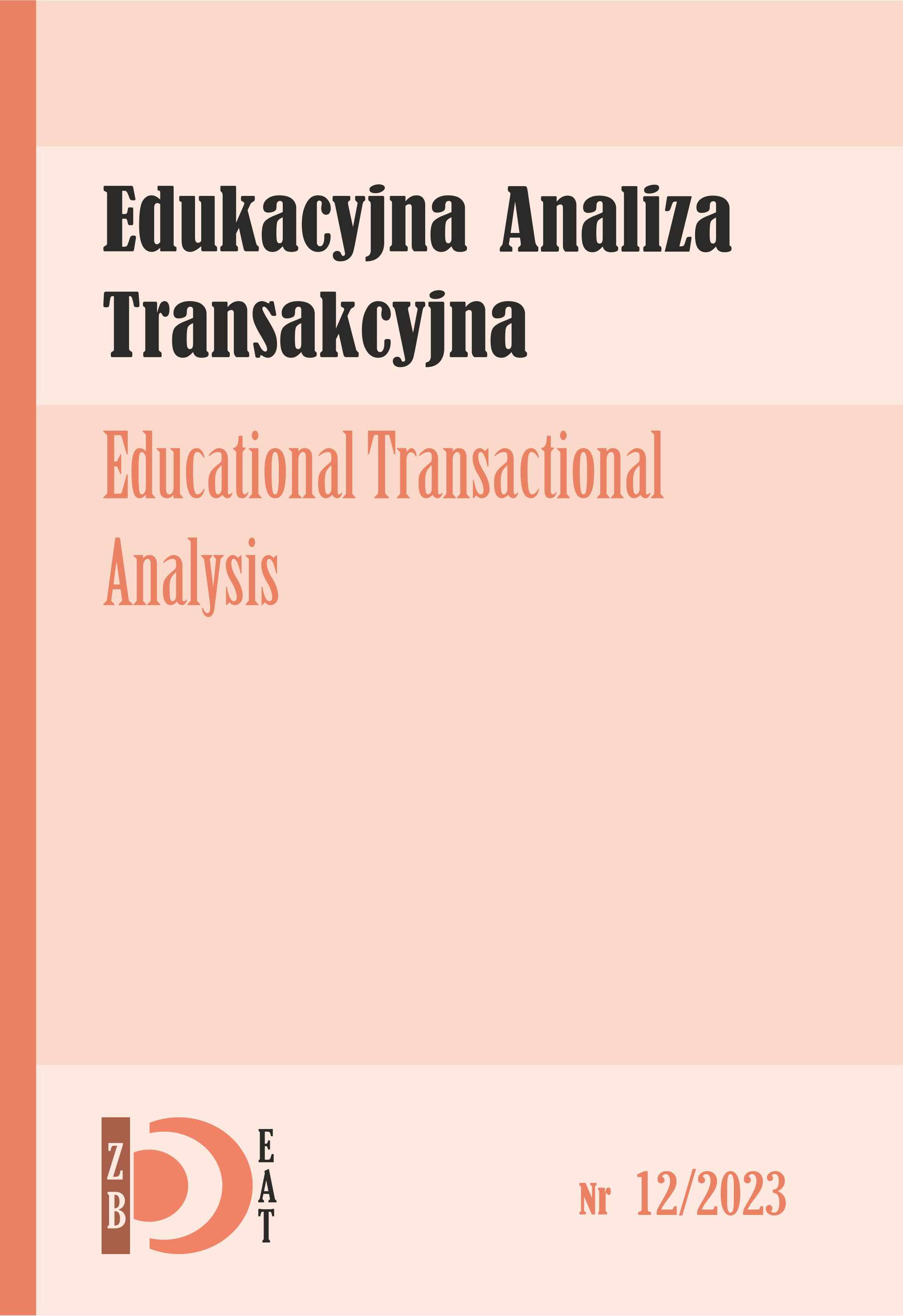Sexual awareness and the structuring of time understood in accordance with the assumptions of transactional analysis. Research report
DOI:
https://doi.org/10.16926/eat.2023.12.04Keywords:
transactional analysis, time structuring, sexual awareness, intimacy, adolescence, relationshipsAbstract
The article is a report on the research conducted as part of the bachelor thesis, based on the concept of time structuring. The author is looking for an answer to the question whether, and if so, what is the relationship between the ability to build intimate relationships, in the meaning of transactional analysis, by young people with their level of sexual awareness? The research was conducted on a sample of 312 people aged 18-22 using questionnaire techniques. The main conclusion from the research indicates the existence of a correlation between the respondents' gender and building intimate relationships. However, no relationship was detected between the level of sexual awareness and building intimate relationships by adolescents.
Downloads
References
Burns, D.D. (2006). When panic attacks: The new drug-free anxiety therapy that can change your life. New York: Morgan Road Books.
Erskine, R.G. (1997). Theories and methods of an integrative transactional analysis. San Francisco: TA Press.
Goldfried, M.R. (2006). Cognitive-affective-relational-behavior therapy. In: G. Stricker, J. Gold (eds.), A casebook of psychotherapy integration (pp. 153–164). American Psychological Association.
Goulding, R. (1985). History of redecision therapy. In: L.B. Kadis (ed.), Re-decision therapy: Expanded perspectives (pp. 9–11). California: Western Institute for Group and Family Therapy.
Goulding, R.L., Goulding, M.M. (1978). The power is in the patient: A TA/Gestalt approach to psychotherapy. San Francisco: TA Press.
James, M., Jongeward, D. (1971). Born to win. New York: Addison-Wesley Publishing.
Kellogg, S., Garcia Torres, A. (2021). Toward a chair work psychotherapy: Using the four dialogues for healing and transformation. American Psy-chologist, 6(3), 171–180; https://doi.org/10.1037/pri0000149.
Mahmood, F., Flax, E. (2023). Gestalt therapy. In: T. Hanley, L. Winter (eds.), The Sage handbook of counselling & psychotherapy: Fifth edition (pp. 403–409). Sage Publications.
McNeel, J.R. (1975). Redecisions in psychotherapy: A study of the effects of an intensive weekend group workshop (PhD thesis). The California School of Professional Psychology.
McNeel, J.R. (1976). The parent interview. Transactional Analysis Journal, 6(1), 61–68.
Perls, F.S. (1969). Gestalt therapy verbatim. Lafayette: Real People Press.
Perls, F.S. (1975). Theory and technique of personality integration. In: J.O. Stevens (ed.), Gestalt is (pp. 44–69). Utah: Bantam Books.
Rogers, C.R. (1961). On becoming a person. Massachusetts: The Riverside Press.
Stark, M. (1999). Modes of therapeutic action. London: Jason Aronson Inc.
Stuntz, E.C. (1973). Multiple chairs technique. Transactional Analysis Jour-nal, 3(2), 29–32.
Tilney, T. (1998). Dictionary of transactional analysis. London: Whurr Pub-lishers.
Watson, J.C., Goldman, R.N., Greenberg, L.S. (2007). Case studies in emo-tion-focused treatment in depression: A comparison of good and poor outcome. Washington: American Psychological Association.
White, T. (2011). Working with suicidal individuals. London: Jessica Kings-ley Publishers.
White, T. (2016). Evolving theory and practice with the self-destructive individual. In: R.G. Erskine (ed.), Transactional analysis in contemporary psychotherapy (pp. 161–183). London: Karnac Books Ltd.
White, T. (2021). Redecision therapy today: A redecision relational ap-proach to transactional analysis. Kyiv: TA Books.
White, T. (2023). Trauma, memory, and the impact of redecision therapy. International Journal of Transactional Analysis Research and Practice, 14(1), 24–31.
Widdowson, M. (2010). Transactional analysis: 100 key points & tech-niques. New York: Routledge.
Young, J.E., Klosko, J.S., Weishaar, M.E. (2003). Schema therapy: A practi-tioner’s guide. New York: Guilford Press.
Downloads
Published
How to Cite
Issue
Section
License
Copyright (c) 2023 Weronika Karaś

This work is licensed under a Creative Commons Attribution 4.0 International License.
I am aware that the Educational Transactional Analysis journal is published under a Creative Commons license - Attribution (https://creativecommons.org/licenses/by/4.0/legalcode).
By submitting the article, I agree to make it available under this license

